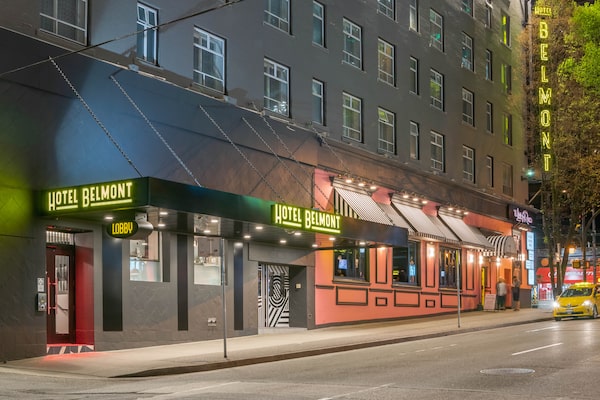
The new exterior of Vancouver's Hotel Belmont.Pacific Reach Properties
How do you connect a heritage hotel to its past while also giving guests a playful, contemporary experience? That was the challenge in restoring a century-old hotel on Vancouver’s Granville Street back to its historic identity as Hotel Belmont.
The hotel at Granville and Nelson in the heart of the city’s night club district had seen better days when Pacific Reach Properties bought what had become a generic Comfort Inn in mid-2017 from then-owner Granville Entertainment Group.
“We didn’t have a clear vision of what we wanted to do with the property, but it had good bones and was in a well-travelled location,” says Azim Jamal, president and chief executive of Pacific Reach, whose portfolio includes a number of hotels, bars and restaurants.
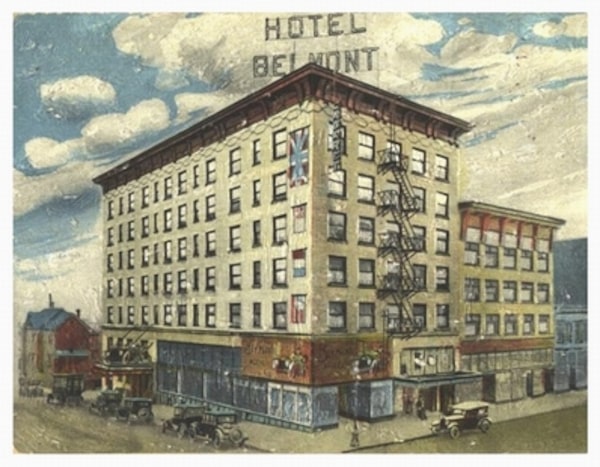
The Belmont originally opened in 1912 as the Hotel Barron before being sold and renamed in 1926.Vancouver Archives
A prime attraction was the fact that the 82-room hotel had received a complete renovation after a fire 15 years earlier. “Because this had gone through extensive upgrades to bring it up to code, a lot of the costly work was already done. To do all this in a century-old building that had not had all the upgrades it received might have been cost-prohibitive.”
The location led to a decision to convert the hotel to a more funky space, he explains. It’s in a popular entertainment zone and it’s only a two-block walk to Robson Street and three blocks to Yaletown. Neighbours include the newly opened Colony Entertainment District bar and arcade.
A team of design firms was assembled with a mandate to honour the past but make the hotel “Instagram worthy” for a millennial clientele.
Playing to the nostalgia for the 1980s that’s big with the millennial demographic, the flamingo pink and sea-foam green colours in the bar and the neon and back-lit public areas have retro-cool elements of popular television shows from that era, such as Miami Vice and movies such as Cocktail.
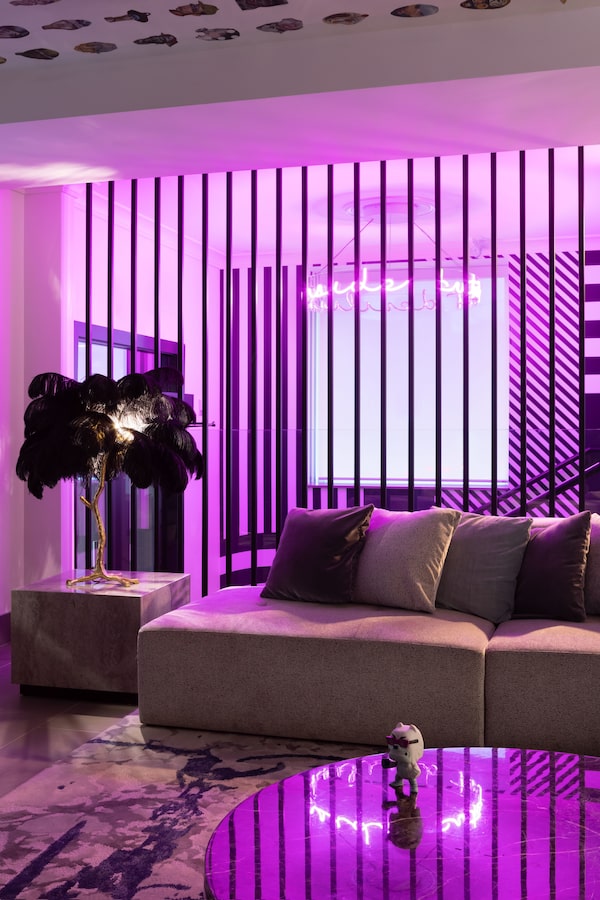
The backlit public areas such as this lobby evoke 1980s touchstones like Miami Vice and Cocktail.Ema Peter
“It’s a niche Vancouver was missing. The city has a fantastic range of luxury hotels and middle-level hotels, but what it doesn’t seem to have in abundance is lifestyle boutiques that are affordable and have a personality and design-forward aesthetic,” says Adèle Rankin, principal of CHIL Interior Design, the hospitality studio of Toronto-based B+H Architects.
The design concept blends history and modernity. “We did some archeology of original elements and brought back heritage character where we could. In the bathrooms there are pedestal sinks and floors done in small mosaic tiles.” Wanting to add touches that are unexpected, the design includes contrasting tiles in the shower floor that spell out “no diving.”
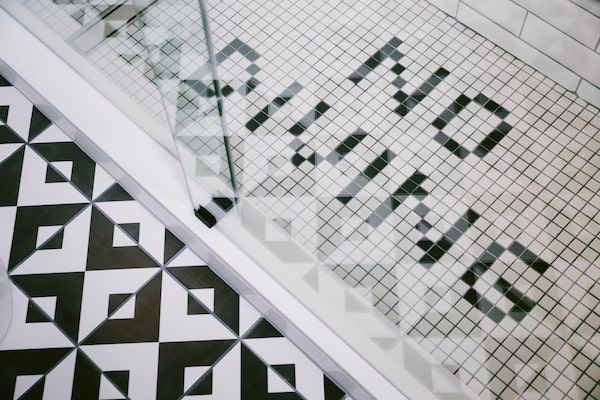
Cheeky tile work in the bathrooms winks at public-pool design.Henry Low
A colour palette of deep blues, creams and yellow was inspired by the district’s heritage tones and they are applied with a whimsical approach. A stripe of dark blue delineates the headboards of beds and goes across the ceiling and down the adjacent wall, with the stripe even colouring one edge of picture frames. A theme of “make your mark” has X-shaped patterns show up on corridor walls. A concurrent historical theme shows up in the artworks curated by Farmboy Fine Arts reflecting Vancouver themes.
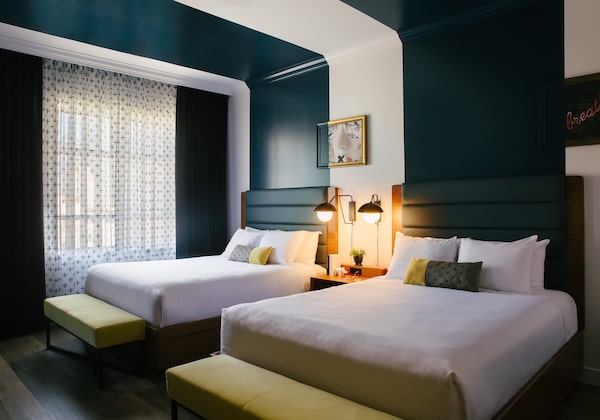
A stripe of dark blue paint extends from the headboards of the beds, up the wall and across the ceiling of the guest rooms.Henry Low
The renovation replaced ceiling cove mouldings that had been stripped out of many room and corridors. The designs add bolder elements than were used in the original hotel. “For instance, the staircases between floors were plain. We used colourful graphic tile on the stair risers, so that if you have to go up the tight staircase, it is a design moment while you’re doing it,” Ms. Rankin says.
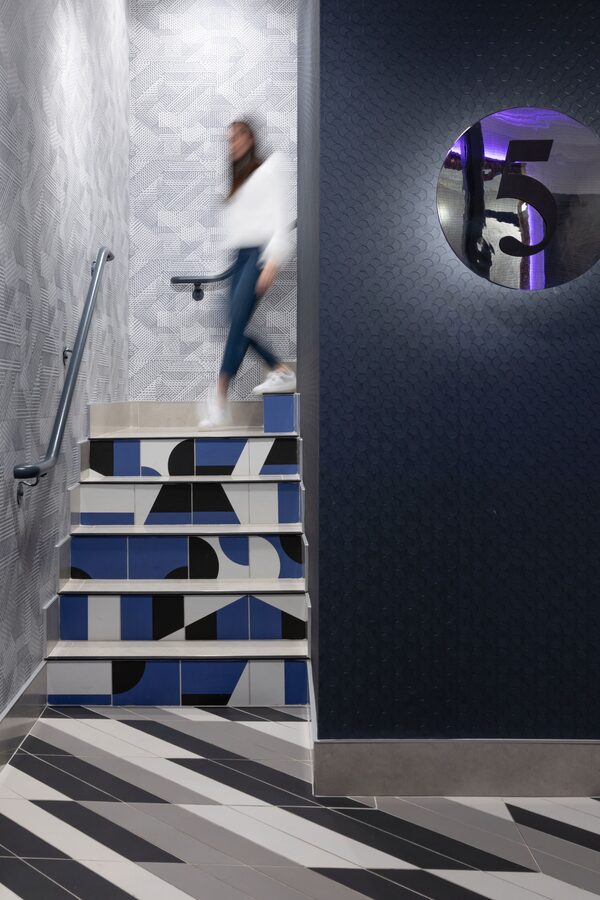
Geometric floor treatments add colour to the Belmont's staircases.Ema Peter
Any work with historic buildings brings challenges, and the major constraint in this project was the small sizes of the rooms and the bathrooms; many may have been added after the hotel was built in 1912, she says. “We knew we couldn’t fill up the rooms with furniture, so as not the squeeze the guests out.” So, closets are open cases that don’t have doors that could impede sight lines. The room safe is located beneath the bed, so it doesn’t take up drawer space.
While the exterior of the hotel has a canopy over the entrance that would be at home in the 1930s, the street level received an attention-grabbing pink paint job. Every element screams out “take a selfie here.”
“We’re aiming at a clientele that is tech savvy. Being Instagram-worthy is not something you had to worry about in the past, but now everyone is looking to document where they are and what they’re doing,” Ms. Rankin says.
That shows up even more strikingly in the Basement lounge in the hotel, designed by Vancouver’s Kado Design and Daniel Meloché Design. It includes flamingo-pink bar stools and a neon-lit DJ booth.
“We’re hoping to do our part to rid Vancouver of the “no fun city” moniker the city in had in the past,” Mr. Jamal says.
That developed because of Vancouver’s strict liquor licensing rules, he says. In Toronto, a liquor licence allows you to have double the capacity to what the same size space in Vancouver is allowed. “People go to Toronto and say, ‘Wow the night clubs have so much energy compared to Vancouver and the reason is the regulations we have in place.’ I don’t know why, but the city has not been motivated to make a change, even though the night-life economy has been a big contributor to the city’s vibrancy.”
Hotel Belmont has watched Vancouver grow
The Hotel Belmont has had its share of ups and downs since it opened its doors in 1912 as the Hotel Barron. Built during a rush of construction on Granville Street before the First World War, it was one of several apartment hotels on the street designed by the architectural firm Parr and Fee.
After the war, prohibition forced the closing of the local saloons, making the hotel unprofitable. It was sold in 1926 to become the Hotel Belmont, which went into further decline during the Great Depression and was resold in 1932.
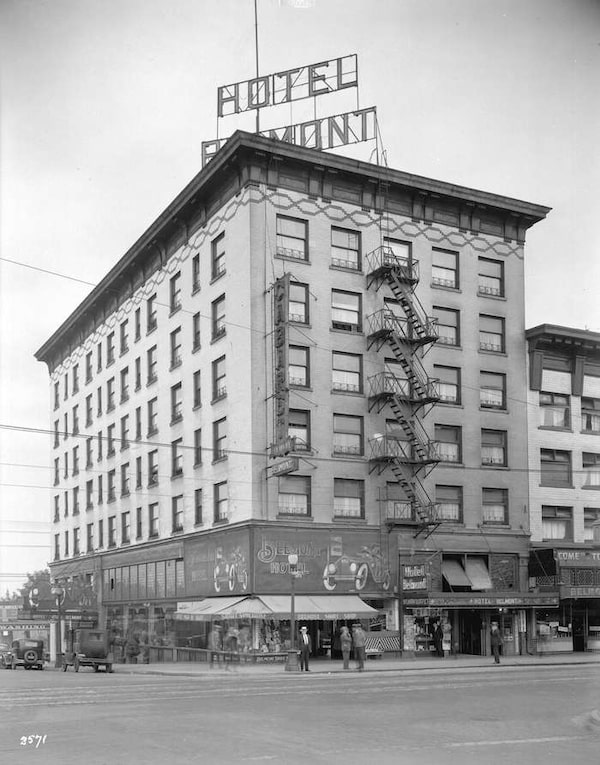
The Belmont in August, 1932.Stuart Thomson/Vancouver Archives
After the Second World War, the street became livelier with the opening of the Granville Street Bridge, but diversion of traffic onto Howe and Seymour streets and removal of streetcar service in the 1950s led to retail giving way to sometimes gritty entertainment venues.
By the 1990s, the hotel was known as the Nelson Place, and featured a strip club, called Champagne Charlie’s, in its basement. That was transformed into Fred’s Uptown Tavern, while the beer parlour on the main floor became Babalu’s Tapas Lounge, where a boy from Burnaby, Michael Bublé, started his singing career. A fire in 2001 led to a complete renovation and the hotel’s bars reopened as Doolin’s Irish Pub and the Cellar Bar.
The Granville Entertainment Group operated the hotel as a Comfort Inn franchise and sold it in July, 2017, to Pacific Reach Properties, which closed the hotel and bars for renovation in November, 2018. It’s gone back to its historic Hotel Belmont name and is now part of the Choice Hotels Ascend Hotel Collection.